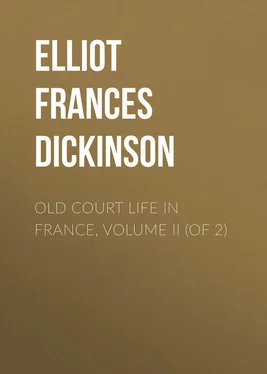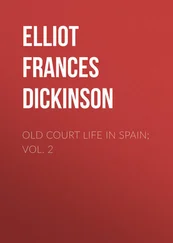Frances Elliot - Old Court Life in France, Volume II (of 2)
Здесь есть возможность читать онлайн «Frances Elliot - Old Court Life in France, Volume II (of 2)» — ознакомительный отрывок электронной книги совершенно бесплатно, а после прочтения отрывка купить полную версию. В некоторых случаях можно слушать аудио, скачать через торрент в формате fb2 и присутствует краткое содержание. Жанр: foreign_antique, foreign_prose, на английском языке. Описание произведения, (предисловие) а так же отзывы посетителей доступны на портале библиотеки ЛибКат.
- Название:Old Court Life in France, Volume II (of 2)
- Автор:
- Жанр:
- Год:неизвестен
- ISBN:нет данных
- Рейтинг книги:4 / 5. Голосов: 1
-
Избранное:Добавить в избранное
- Отзывы:
-
Ваша оценка:
- 80
- 1
- 2
- 3
- 4
- 5
Old Court Life in France, Volume II (of 2): краткое содержание, описание и аннотация
Предлагаем к чтению аннотацию, описание, краткое содержание или предисловие (зависит от того, что написал сам автор книги «Old Court Life in France, Volume II (of 2)»). Если вы не нашли необходимую информацию о книге — напишите в комментариях, мы постараемся отыскать её.
Old Court Life in France, Volume II (of 2) — читать онлайн ознакомительный отрывок
Ниже представлен текст книги, разбитый по страницам. Система сохранения места последней прочитанной страницы, позволяет с удобством читать онлайн бесплатно книгу «Old Court Life in France, Volume II (of 2)», без необходимости каждый раз заново искать на чём Вы остановились. Поставьте закладку, и сможете в любой момент перейти на страницу, на которой закончили чтение.
Интервал:
Закладка:
After he had prayed very devoutly, and kissed the crucifix repeatedly, he rose from his knees, and again in a firm voice repeated, "I am ready, begin!" Then he added, "May God have mercy upon me, and forgive my sins." He threw away his hat, unloosed the lace ruff about his throat, put back his hair from his face, and laid his head on the block. Several blows descended ere his head was severed from the body; the executioner being unready and new to his office. When the head fell it gave a bound, turned itself a little on one side, and the lips palpitated visibly, the eyes being wide open. The body was covered with the scarlet mantle borne by Cinq-Mars on his arm for that purpose, and carried away to be buried.
The King, informed by the Cardinal of the precise day and hour when Cinq-Mars would suffer death, – for every detail had been virtually arranged before Richelieu left Valence in his wooden chamber, – took out his watch at the appointed time, and, with the most perfect unconcern, remarked to Chavigny, "At this moment Monsieur le Grand is making an ugly face at Lyons."
Then Richelieu ordered that the feudal castle of Cinq-Mars, in the valley of the Loire, should be blown up, and the towers razed " to the height of infamy ."
CHAPTER VII.
THE END OF THE CARDINAL
WHEN the Louvre was a walled and turreted stronghold, with moat and drawbridge, bastion and tower, lying on grassy banks beside the river Seine, then unbordered by quays and untraversed by stone bridges, an ancient castle, strongly fortified, stood in the open country, hard by, without the city walls. In the time of Charles VI., the mad king, husband of the notorious Isabeau de Bavière, this castle belonged to Bernard Comte d'Armagnac, Constable of France, the ally of the English against his own sovereign, and a leader in those terrible civil wars that desolated France throughout the space of two reigns. Hither the English and the Burgundians often repaired, to meditate some murderous coup de main upon the capital, to mass their bloodthirsty troops for secret expeditions, or to seek a safe retreat when the fortune of war was adverse. As time went by this castle grew grey with age; the rebel nobles to whom it belonged were laid in their graves; no one cared to inhabit a gloomy fortress, torn and battered by war and sacked by marauders. The wind howled through the desolate chambers, owls hooted from the rents in its turrets, and noisome reptiles crawled in the rank weeds which choked up its courts. It came to be a gruesome place, lying among barren fields, where the ruffians and desperadoes of the city resorted to plan a murder or to hide from justice. This God-forgotten ruin and the foot-trodden fields about it were purchased at last by wealthy nobles, who loved the fresh country breezes beyond the new streets which now arose on this side of the river. The materials of the old castle served to furnish walls for the palaces of the Rambouillets and the Mercœurs, historic names in every age of the national annals. Here they kept their state, until Cardinal Richelieu, either by fair means or foul, it mattered little to him, bought and destroyed their spacious mansions, pulled down all that remained of the castle walls, filled up the ditches, levelled the earth, and, on the ill-omened spot, raised the sumptuous pile known as the Palais Cardinal, near, yet removed from, the residence of the sovereign at the Louvre. The principal buildings ran round an immense central square, or courtyard, planted symmetrically with trees and adorned with fountains and statues. From this central square four other smaller courts opened out towards each point of the compass. There was a chapel splendidly decorated, and, to balance that, two theatres, one sufficiently spacious to hold three thousand spectators, painted on panel by Philippe de Champagne. There were ballrooms furnished with a luxury unknown before; boudoirs – or rather bowers – miracles of taste and elegance; galleries filled with pictures and works of art, and countless suites of rooms, in which every decoration and adornment then practised were displayed. Over the grand entrance in the Rue Saint-Honoré appeared, carved in marble, the arms of Richelieu, surmounted by a cardinal's hat and the inscription "Palais Cardinal." Spacious gardens extended at the rear.
Still the Cardinal, like Wolsey at Hampton Court, added wall to wall of the already overgrown palace, and bought up street after street within the city to extend the gardens, until even the subservient Louis showed some tokens of displeasure. Then, and not till then, did the Cardinal cease building. At his death he presented his palace to the sovereign; and from that day to this the Palais Cardinal, now Palais Royal, has become an appanage of the State.
Before us stands the Palais Cardinal – solitary, in the midst of lonely gardens, sheltered by waving groves. The greensward is divided by straight walks, bordered by clipped lime-trees, rounded at intervals into niches for statues and trophies; balustraded terraces border deep canals, and fountains bubble up under formal groups of yew or cypress. The palace casts deep shadows on the grass. It is very still. High walls encircle the enclosure. The very birds are mute. Not the bay of a hound is heard. Moss gathers on the paths and among the tangled shrubberies, and no flowers catch the radiance of the sunshine. Within is the great, the terrible Cardinal. The ground is sacred to the despot of France, the ruler of the monarch, the glance of whose eye is death or fortune. Journeying direct from Lyons in his chamber on wheels – after the execution of Cinq-Mars – to Fontainebleau, where he rested, he is come here to die. Yonder he lies on a bed of state, hung with embroidered velvet in a painted chamber, the walls covered with rare pictures and choicest tapestry, the windows looking towards the garden. The moment approaches when he will have to answer for his merciless exercise of absolute power over king and people, to that Heavenly Master whose priest and servant he professes to be. How will he justify his bitter hatred, his arrogant oppression of the great princes and nobles of France? How will he meet the avenging ghosts of the chivalrous Montmorenci, the poetic Chalais, the gallant Cinq-Mars, the witty Saint-Preuil, the enthusiastic Urbain Grandier, in the unknown country whither he is fast hastening? Who tried to seduce, then to ruin, the Queen, Anne of Austria, and send her back, divorced and disgraced, into Spain? Who turned the feeble Louis into a servile agent of his ambition, and exercised over his weak mind a tyranny as shameful to himself as degrading to the sovereign? True, Richelieu may plead reasons of State, a rebellious nobility, traitorous princes, and an imbecile king; but the isolation of the throne, begun under his rule, was both barbarous and impolitic, as after ages showed. True, he possessed rare genius, and his life was industriously devoted to what he called " the glory of France "; but it was a mean and selfish glory, to attain which he had waded through the noblest blood of the land.
Look at him now – he has just received extreme unction. A hypocrite to the last, he folds his hands on his breast and exclaims – "This is my God; as in his visible presence, I declare I have sacrificed myself to France." When he is asked by the officiating priest – "If he forgives his enemies?" – he replies, "I have no enemies but those of the State." Now the hand of death is visibly upon him. In a loose robe of purple silk, he lies supported by pillows of fine lace. He is hardly recognisable, so great have been his sufferings, so complete is his weakness; his bloodless lips pant for breath, his hollow eyes wander on vacancy, his thin fingers work convulsively on the sheets, as though striving against the approach of invisible foes.
Читать дальшеИнтервал:
Закладка:
Похожие книги на «Old Court Life in France, Volume II (of 2)»
Представляем Вашему вниманию похожие книги на «Old Court Life in France, Volume II (of 2)» списком для выбора. Мы отобрали схожую по названию и смыслу литературу в надежде предоставить читателям больше вариантов отыскать новые, интересные, ещё непрочитанные произведения.
Обсуждение, отзывы о книге «Old Court Life in France, Volume II (of 2)» и просто собственные мнения читателей. Оставьте ваши комментарии, напишите, что Вы думаете о произведении, его смысле или главных героях. Укажите что конкретно понравилось, а что нет, и почему Вы так считаете.












